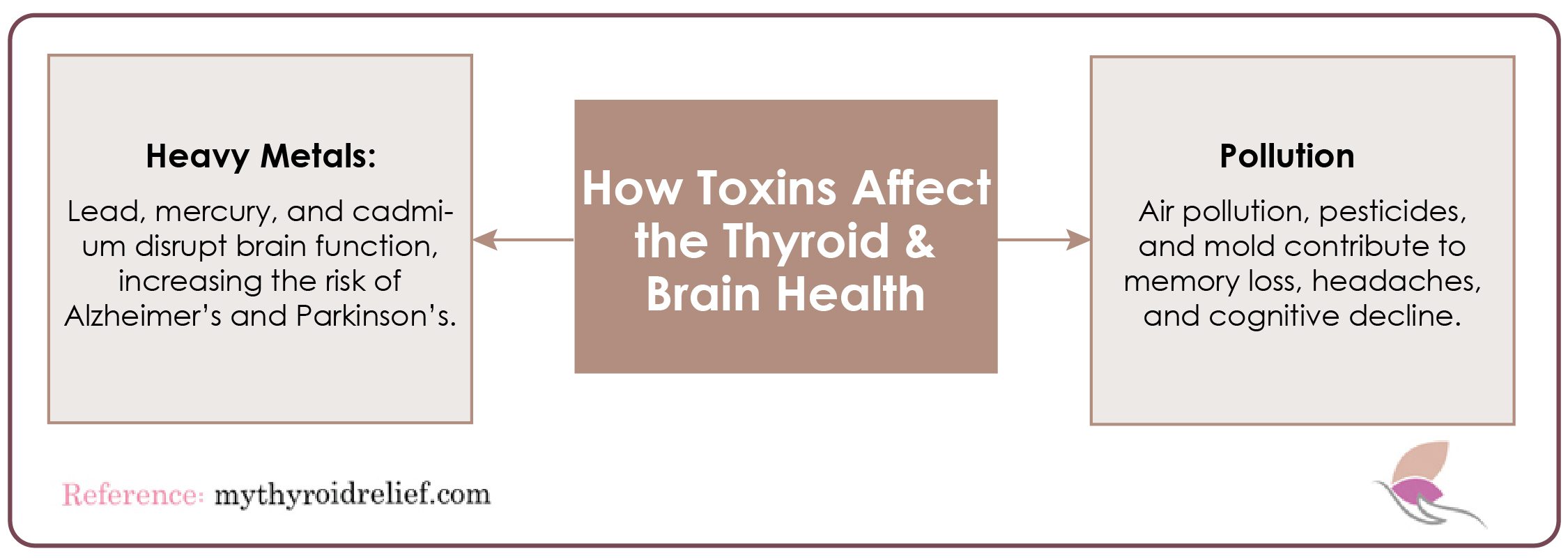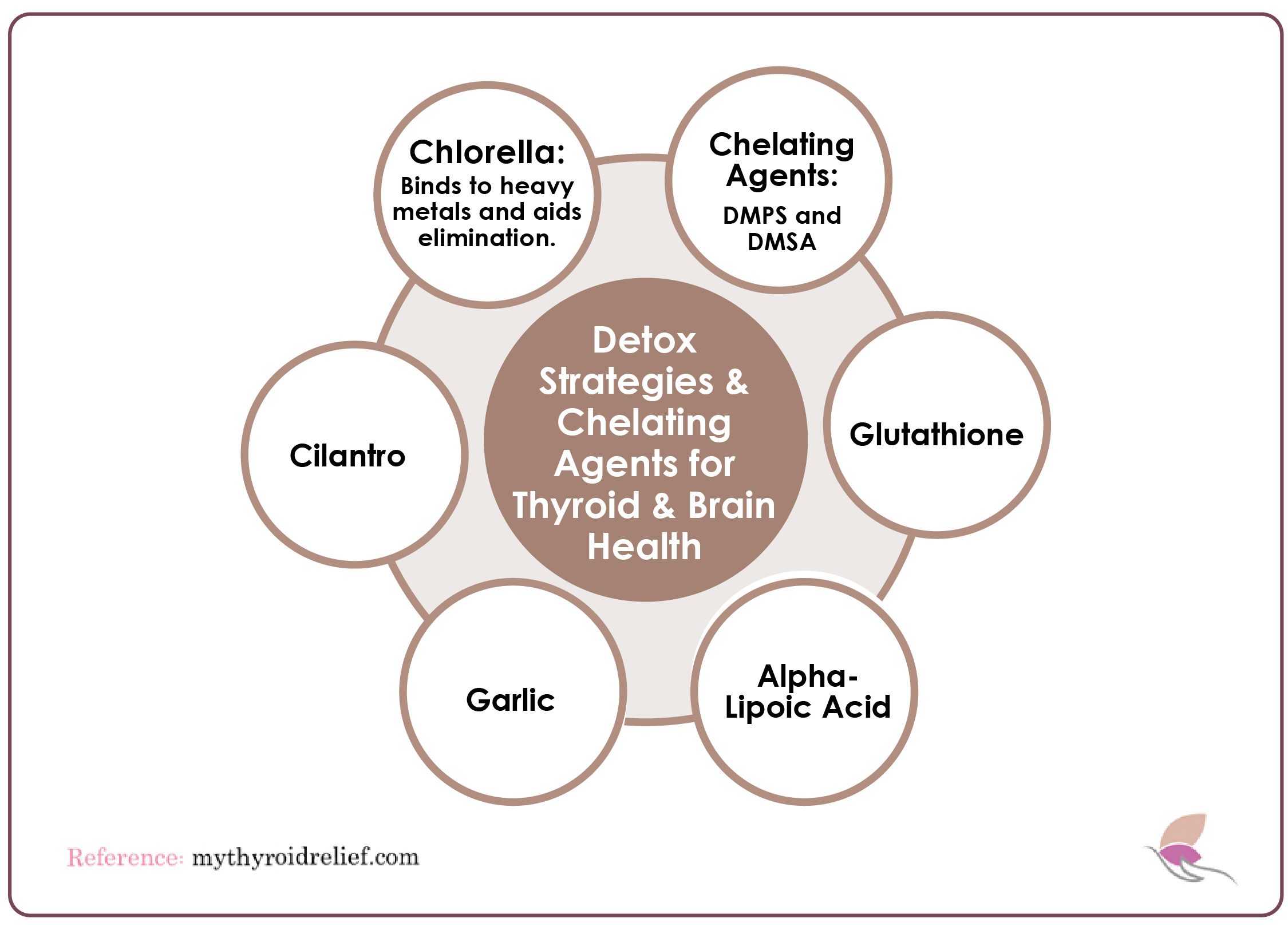
The first time I believed I had a medical condition was when I felt disoriented, and my memory declined. I didn’t know much about the thyroid-brain connection, but I felt my mental sharpness decline. My husband posted a daily to-do list on the garage door because I kept forgetting simple tasks. I constantly forgot doctor’s appointments, conferences, birthdays, and bills. My memory became so unreliable that I just wanted to stay in bed until school pickup.
Feeling Good is Possible
After undergoing a holistic treatment plan, I started to feel like myself again. I was mentally clearer and had the energy to manage multiple projects. Little did I know that my brain fog and memory issues were due to hypothyroidism. This article explores the connection between thyroid function and brain health and how treating thyroid issues can enhance cognitive function.
The Thyroid-Brain Connection: How They Work Together

The thyroid and the brain have a close relationship. A healthy thyroid is essential for brain health, preventing cognitive decline and supporting neural plasticity, which is the brain’s ability to adapt and change. The thyroid connects to the brain through a network of glands and hormones. It starts with the hypothalamus, which sends signals to the pituitary gland. The pituitary gland then communicates with the thyroid, adrenals, ovaries, and other glands. The brain and gut must produce enough neurotransmitters like dopamine and serotonin for the hypothalamus to function properly. Without this production, communication between the brain and the thyroid can break down, leading to memory issues and concentration difficulties.
How Does Hypothyroidism Affect Specific Brain Structures?

1. Thyroid Hormones and Brain Function
The thyroid gland produces hormones essential for the formation and maturation of the body during human development and growth. However, when these hormones are misregulated in adulthood, they can negatively impact brain function. If left untreated, thyroid diseases, such as hypothyroidism, can lead to psychiatric issues. Hypothyroidism can cause symptoms like drowsiness, sluggishness, and memory loss and is linked to bipolar disorder and depression.
The exact cause of memory issues in hypothyroidism is unclear, but thyroid hormones critically affect memory-related brain areas.
2. Thyroid Hormones and Their Impact on Memory
One of the primary cognitive functions impacted by hypothyroidism is memory. Studies indicate that long-term memory is often more affected, particularly with verbal memory problems over visual memory issues. These memory impairments are more likely to affect short-term memory as well. The encouraging news is that memory issues caused by hypothyroidism can often be improved or reversed. With proper medication, dietary changes, and regular exercise, significant improvements in memory function can occur.
3. Impact of Hypothyroidism on Attention
Hypothyroidism can also impair attention, making it difficult to focus on tasks that require sustained concentration. Some individuals experience sustained attention disorders, while others deal with intermittent attention difficulties. Symptoms of hypothyroidism increase distractibility and make it hard to complete tasks requiring consistent attention.
4. Thyroid’s Influence on Executive Functions
Executive functions, which involve planning, organizing, and regulating tasks, are often compromised by hypothyroidism. Individuals may struggle with organizing activities, managing time, and setting goals. Slow processing speeds and delayed reactions can also affect daily life and routine activities. Research indicates that both hypothyroidism and hyperthyroidism can mimic mild dementia symptoms, including cognitive decline and slower processing.
Strengthening the Brain-Thyroid Connection: What You Can Do

If you have thyroid issues, here are steps you can take to improve brain and cognitive function:
1. Tailored Thyroid Hormone Replacement
Check your FT4, FT3, and RT3 levels regularly to monitor thyroid hormone balance and ensure proper conversion and function. Work with your doctor to determine the right thyroid hormone replacement dose that suits your body, free from additives, dyes, and allergenic fillers. If needed, especially in cases of issues with T4-to-T3 conversion, consider slow-release T3 medication under your doctor’s supervision. Consistent monitoring will ensure your treatment is optimized for better thyroid health.
2. Healthy Diet and Brain-Thyroid Health: Key Nutrients to Focus On
A. Diet’s Role in Supporting Brain and Thyroid Function
A balanced diet is vital in supporting both thyroid and brain health. Focus on organic vegetables, fruits, and healthy fats, such as omega-3s, to promote thyroid function and enhance cognitive performance. A gluten-free, refined-sugar-free diet, alongside organic produce, grass-fed proteins, and wild-caught fish, provides the nutrients necessary for optimal brain function. Additionally, lean meats and legumes should be consumed in moderation, focusing on easy-to-digest foods to improve digestion and nutrient absorption. With better digestion, your body can absorb nutrients more effectively, supporting brain health and boosting mood, memory, and cognitive function.
B. Essential Nutrients for Thyroid and Brain Health
A nutrient-dense diet is key to maintaining optimal thyroid function, which in turn supports brain health. The thyroid produces hormones that regulate metabolism, impacting the brain and other body systems. Important nutrients for thyroid and brain health include:
-
Iodine: This essential mineral is vital for the production of thyroid hormones, which regulate metabolism and brain function. Without enough iodine, the thyroid can’t produce sufficient hormones, leading to hypothyroidism, which can cause brain fog and memory issues.
-
Selenium: Selenium supports the conversion of T4 into the active T3 hormone, which is crucial for brain function. It is also a powerful antioxidant, protecting the brain from oxidative stress.
-
Zinc: Zinc is essential for hormone metabolism, immune function, and enzyme activity. A deficiency in zinc can impair thyroid function, leading to cognitive decline and difficulty concentrating.
-
Iron: Iron is necessary for thyroid hormone production and for transporting oxygen to the brain. Iron deficiency can cause cognitive decline, fatigue, and poor concentration.
-
Omega-3 Fatty Acids: Found in fish oil and flaxseeds, omega-3s support brain function, reduce inflammation, and promote thyroid hormone activity. These fatty acids are essential for brain health, enhancing mood and cognitive function.
-
Vitamin D3: Vitamin D3 regulates immune function, supports thyroid activity, and enhances brain health. It plays a crucial role in reducing inflammation and improving mood.
-
Vitamin C: As a powerful antioxidant, vitamin C helps protect the thyroid and brain from oxidative stress. It also supports detoxification, immune health, and collagen production.
3. Foods to Avoid for Better Thyroid and Brain Health
Certain foods can negatively impact thyroid and brain function by promoting inflammation and impairing neurotransmitter function. To support optimal health, avoid the following:
-
Processed Foods: High in unhealthy fats, including trans fats, preservatives, artificial additives, and sodium, as well as unhealthy vegetable oils such as soybean, corn, sunflower, and canola oil, processed foods can disrupt thyroid hormone production and impair brain function. These foods often lack essential nutrients like iodine, selenium, and zinc, which are necessary for thyroid health.
-
Refined Sugars: Consuming refined sugars and corn syrup can cause blood sugar spikes and crashes, leading to fatigue, irritability, and mental drain. A high-sugar diet may also contribute to insulin resistance, which is linked to cognitive decline and neurodegenerative diseases. Reducing sugar intake helps stabilize blood sugar levels, improve energy, and enhance cognitive function.
-
Alcohol: Alcohol can impair the liver’s ability to process thyroid hormones, leading to imbalances that affect metabolism and cognitive health. Chronic alcohol use can damage brain cells and disrupt sleep patterns, which negatively impacts memory, mood, and cognitive function.
Impact of Toxins on Brain Health and Detoxification

1. Heavy Metals and Cognitive Decline
Heavy metals such as lead, mercury, and cadmium are particularly harmful to brain health due to their ability to accumulate in the body over time. These toxins disrupt neurotransmitter function, damage neurons, and contribute to cognitive impairment. Mercury exposure, for example, has been directly linked to cognitive decline and is associated with an increased risk of neurodegenerative diseases like Alzheimer’s and Parkinson’s. Lead exposure, even at low levels, can impair intellectual function and has been linked to reduced IQ and attention deficits in children, as well as cognitive decline in adults.
The impact of heavy metals on brain health is concerning, as even small amounts of exposure can have long-term consequences. It’s essential to minimize exposure to these harmful substances to protect cognitive function.
2. Environmental Pollution and Brain Health
Air pollution, pesticides, and everyday chemical exposures are also significant contributors to cognitive deterioration. Research has shown that exposure to air pollution increases the risk of dementia and cognitive decline. Pesticides and mold exposure are especially harmful, contributing to issues such as memory loss, headaches, and difficulty concentrating, largely due to oxidative stress in the brain. Long-term exposure to these environmental pollutants can worsen existing health conditions and lead to a gradual decline in overall health. Taking steps to minimize exposure to these toxins is crucial for preserving cognitive health.
Detox Strategies for Thyroid and Brain Health

The thyroid and brain are highly sensitive to toxins, including heavy metals and environmental pollutants, which can disrupt their normal functioning. Detoxification strategies, including supplements and medical interventions, can help eliminate these harmful substances, reduce oxidative stress, and restore optimal health.
Below are some of the most effective approaches for supporting detoxification and protecting thyroid and brain health.
1. Top Detox Supplements for Thyroid and Brain Health
Supplements play a significant role in detoxifying the body by helping to remove heavy metals and other harmful toxins. Key detox supplements include:
- Chlorella: A potent detoxifying agent known for its ability to bind to heavy metals and assist in their elimination from the body.
- Cilantro: Often recognized for its potential to help the body eliminate heavy metals, cilantro enhances the detoxification process.
- Garlic: Renowned for its detoxifying properties, garlic aids in removing harmful substances and supports overall health.
- Alpha-Lipoic Acid: This powerful antioxidant neutralizes free radicals and enhances the body’s natural detoxification mechanisms.
- Glutathione: A vital antioxidant that reduces oxidative stress, glutathione plays a key role in supporting both brain and thyroid health.
2. Oral Chelating Agents (DMPS, DMSA)
Specialized chelating agents like DMPS and DMSA are designed to bind with and remove heavy metals such as mercury and lead from the body. Due to their potency and potential side effects, these agents must be administered under strict medical supervision to ensure safety and effectiveness.
References
- https://hms.harvard.edu/news/how-thyroid-hormone-fuels-drive-explore
- https://www.thyforlife.com/the-thyroid-and-the-brain/
- https://www.sciencedirect.com/science/article/abs/pii/S2451965017300054
- https://www.news-medical.net/news/20240823/Exploring-the-impact-of-thyroid-hormone-on-brain-function.aspx
- https://www.mentalhealth.com/library/thyroid-dysfunction-and-mental-health
This post is enlightening as it shows how disruptions in thyroid function can impact mental and neurological health. By exploring these connections, we gain a deeper appreciation for the holistic nature of health and the importance of comprehensive thyroid care. Thanks for sharing such valuable insights!